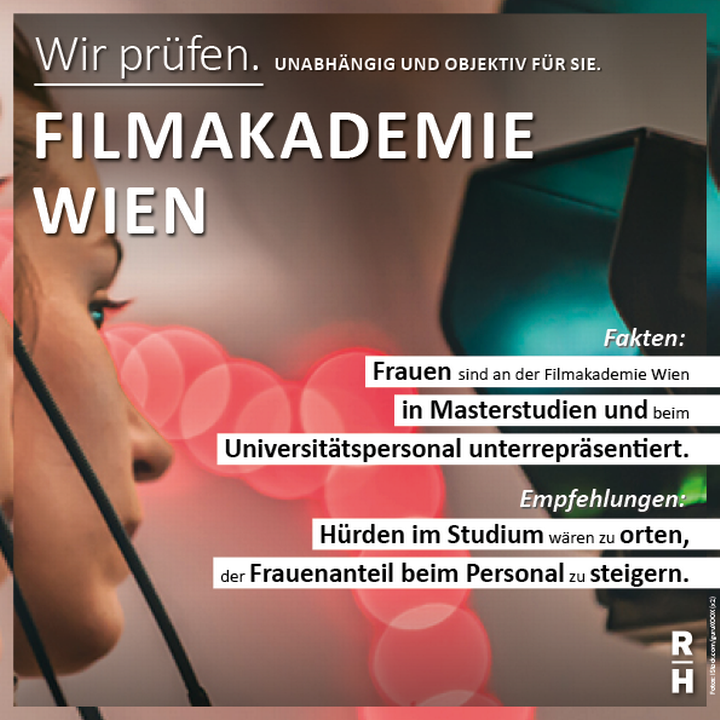Film Academy Vienna: women underrepresented among master students and university staff

The Austrian Court of Audit (ACA) audited the Film Academy Vienna in part at the suggestion of citizens. The good news: students were successful with their film projects at festivals. The Film Academy supported their participation in national and international competitions. However, the ACA sees a need for improvement, for example as regards students’ activity. Despite good student-teacher ratios, comparatively few students graduate from the Film Academy. In addition, particularly the master’s degree programmes are clearly dominated by men. Women are also underrepresented among the university staff. The ACA audited the academic years 2016/17 to 2020/21.
The Film Academy is one out of 25 institutes of the University of Music and Performing Arts Vienna (mdw). It offers a total of five bachelor’s and six master’s degree programmes. In the academic year 2020/21, 2,825 students were regularly enrolled at the mdw, 264 of which at the Film Academy.
Gender ratio in new admissions balanced at first
Almost half of all students in bachelor’s degree programmes, namely 47 per cent, were female. However, female students are underrepresented in master’s degree programmes, where women accounted for 34 per cent. The ACA puts this down to the fact that more female students than male students dropped out of university. The ACA’s auditors positively note that the gender ratio was initially balanced in both bachelor’s as well as master’s degree programmes.
The ACA recommends to the mdw to determine the cause of the discrepancy between a relatively balanced gender ratio in new admissions and a significantly lower share of women actually studying in the master’s degree programmes and develop measures based on this.
Likewise, women are underrepresented among the university staff at the Film Academy with a share of 31.9 per cent. The mdw’s plan for the promotion of women was largely not realized.
Few graduations, long study durations
Each year, an average of ten persons graduated with a bachelor’s degree and four with a master’s degree. The average study duration of the bachelor’s degree programmes, which are designed to take six semesters according to the curriculum, was ten semesters. The four-semester master’s degree programmes were completed within an average of twelve semesters. No one has graduated with a master’s degree in the field of Screenwriting and Dramaturgy since the academic year 2013/14. At the Film Academy, 71 per cent of bachelor’s students and 39 per cent of master’s students were active in terms of taking exams, which means that they earned at least 16 ECTS points per academic year.
The ACA critically notes that despite a favourable student-teacher ratio the Film Academy had below-average activity in terms of exams and a low number of graduates. A survey of graduates revealed that paid work, but also organizational and structural hurdles, led to longer durations of study. The ACA recommends that organizational and structural hurdles be identified and that measures be taken to improve the conditions for studying at the Film Academy.
Problematic feedback
At the mdw, the courses of an institute are evaluated every five years. The Film Academy was evaluated in the summer semester 2016 and in the winter semester 2020/21. Due to this long interval, relevant information on the general conditions and the quality of teaching was missed. The evaluations of courses were primarily meant to provide teachers with feedback. Problematic feedback was supposed to be addressed by the vice rector who is in charge of teaching – normally in the form of a one-on-one meeting. After a male teacher had reacted with incomprehension to the vice rector’s invitation to a meeting, she refrained from insisting. Subject of the problematic feedback had been condescending and sexist remarks.
Since 2016, the salary progressions according to collective agreement of professors at the Film Academy has in principle been tied to personal evaluations. In isolated cases, individuals’ salaries progressed without such an evaluation.
Furthermore, the ACA sees a need for improvement as regards the reporting of outside employments. In the context of film productions outside the mdw, for example, employments remained unreported in numerous cases.
Accounting-related shortcomings
Under certain circumstances, budgets are available to students for their film projects. When reviewing the receipts that the students submitted for accounting purposes, the ACA found a number of shortcomings. The Film Academy’s management partly approved receipts for payment even though they did not fulfil all the requirements. In addition, the chaotic project accounting made control management very difficult.
The ACA recommends that receipts be approved for payment only if they comply with legal and internal regulations. Furthermore, the introduction of the internal control system had not yet been completed at the time of the audit.
After a professor’s death in May 2017, the Film Academy received a bequest amounting to EUR 100,000. An association was established. Its purpose: financial support for individual students and student projects as well as maintenance of national and international cooperations. Five years after the testator’s death, the donation has not yet been used in his interest.
- pdf Datei:
- 4,350.3 KB
- Umfang:
- 126 Seiten
Report: Film Academy Vienna (in German)
From September 2021 to February 2022, the ACA audited the Film Academy Vienna – Institute for Film and Television at the University of Music and Performing Arts Vienna. The audit aimed at assessing the activities of the Film Academy as a training institution for future filmmakers and film scholars, the administration with regard to the use of personnel and resources as well as compliance, the financial situation, the cooperation with funding associations, and the performance of the tax and control function of the University of Music and Performing Arts over the Film Academy. The audited period spanned the years from 2016 through 2020 or the academic years 2016/17 to 2020/21.


